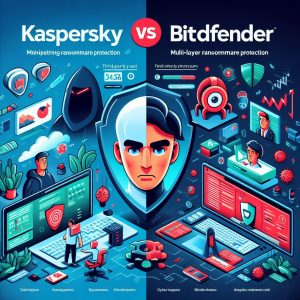I. Introduction
Antivirus software plays a critical role in protecting devices from an onslaught of sophisticated malware attacks. As cyber threats grow more advanced, relying on robust security suites with real-time monitoring and threat detection has become essential. Two industry leaders in the consumer and commercial antivirus space are Kaspersky and Bitdefender. They have developed full-featured suites of security tools focused on malware identification, vulnerability protections, performance optimization and ease of use.
This guide provides an in-depth, side-by-side comparison of these two cybersecurity giants based on malware detection proficiency, system resource usage, value-added features beyond core antivirus, pricing tiers, and overall usability. By evaluating their respective strengths and weaknesses, consumers can determine which platform best fits their household or organizational needs.

II. Background Information
Kaspersky ranks as one of the longest tenured endpoint security software vendors, initiating operations in 1997 fueled by founder Eugene Kaspersky’s advanced degrees in cryptography, mathematics and computer technology. The Moscow-based firm has grown dramatically over the past two decades, amassing over 400 million global users attracted to its constantly evolving suite of antivirus tools and anti-malware innovations. Its product set spans across consumer, small business, and enterprise solutions.
Bitdefender provides equally robust competition originating from Bucharest, Romania – also founded by a technology entrepreneur with advanced security insights. Starting in 2001, Bitdefender has emerged as a consumer favorite and enterprise leader as well, blending artificial intelligence and machine learning into its antivirus, anti-ransomware, online privacy, and cross-platform support capabilities serving over 500 million devices today.
While Symantec/Norton garners the overall highest market share in cybersecurity, Kaspersky and Bitdefender remain neck-and-neck battling for second place among the growing landscape of firewall, antivirus, anti-malware and endpoint detection & response solutions protecting networks globally.
III. Malware Protection
As hackers increase malware sophistication exploiting cryptocurrency mining, spyware spreading, and file-less attacks – arming devices with advanced threat detection and virus elimination proves essential. Both platforms have invested heavily in these core competencies:
Kaspersky
- Real-Time Scans monitor device activity
- Detects 99.6% of malware samples in testing environments
- “HuMachine” merges human expertise with AI to improve protections
- Includes specific ransomware countermeasures
Bitdefender
- Multi-layered approach for both known and zero-day exploits
- Identified as the top malware performer by AV Test Institute
- Integrates targeted behavioral monitoring tools
- Machine-learning enabled for anticipatory threat defense
While their anti-malware technical architectures differ, the top-tier results each achieves make differentiating between Kaspersky and Bitdefender extremely difficult. Both far exceed competitors in head-to-head malware exposure testing – blocking nearly 100% of viruses, trojans, worms, spyware, ransomware, adware, and phishing scams. Savvy cybercriminals certainly have their hands full trying to outwit these advanced prevention suites.
For families and businesses seeking virtually impenetrable malware protection, either platform will suffice exceedingly well.
IV. System Performance
Antivirus platforms absorb significant processing overhead, taxing CPU and memory during ongoing file access monitoring, data scanning, and security analytics. Optimized performance and minimal drag on system resources becomes imperative as users stream video, surf crowded webpages, or access resource-intensive business applications. Here again, Kaspersky and Bitdefender stand out among contemporaries based on independent lab testing:
Kaspersky
- Impressively fast Quick Scan capability
- On-demand Isolated Scans avoid locking files
- Gamer Mode to Suspend Scans during gameplay
- Light-touch Default Settings minimize CPU load
Bitdefender
- #1 Ranking for Least System Interference by AV Test
- 60% faster scanning than competitors in benchmarking
- Imperceptible performance degradation measured
- Optimized to maintain responsiveness during tasks
Both vendors make performance optimization and seamless user experience central to their design approach – Bitdefender holding a slight edge particularly across boot time, shutdown time and installing/launching applications. But Kaspersky shares impressive benchmarks as well even with all protection layers fully operational.
Unless scanning heavily strained network infrastructure or older endpoint devices, consumers should encounter superb performance with either platform installed locally.
V. Features and Additional Tools
Expanding beyond core antivirus and anti-malware protections into adjacent areas like identity protection, password management, VPN, online backup/sync or device optimization provides added value to users seeking convenient all-in-one security bundling:
Kaspersky
- Kaspersky VPN Secure Connection
- Kaspersky Safe Kids controls and monitors children’s digital usage
- Kaspersky Password Manager generates/stores secure login credentials
- Kaspersky Disk Cleaner reclaims hard drive storage space
Bitdefender
- Bitdefender VPN provides encrypted traffic tunneling
- Bitdefender Password Manager enables shared team access
- Bitdefender Smart Home Network monitors router, devices, and traffic
- Bitdefender Tune-Up clears junk files and optimizes OS
With each company offering virtual private networking, password vaults, performance enhancements and more – differentiating again proves difficult. Kaspersky leads supporting parental controls through Safe Kids, while Bitdefender counters with full home network visibility.
For ancillary components, specific feature preferences for VPN, password security, parental oversight, etc. will determine which set of tools provides superior complete solution.

VI. Pricing and Plans
Not surprisingly, entering the premium security space carries higher financial commitment. However, Kaspersky and Bitdefender present flexible alternatives scaling from free stripped-down versions up through to identity/financial protection bundles or customized enterprise suites.
Comparing mid-tier pricing best suited for families and small business owners shows strong value overall:
Kaspersky Internet Security
- $79.99 List/$59.99 Retail 1 Device Annual
- $99.99 List/$74.99 Retail 3 Device Annual
Bitdefender Total Security
- $89.99 List/$44.99 Retail 5 Device Annual
- $119.99 List/$59.99 Retail 10 Device Annual
With routinely discounted retail promotions up to 50% off list pricing, both deliver tremendous bang-for-the-buck in their sweet spot subscription tiers. Kaspersky yields pricing advantage for single device/user accounts, whereas Bitdefender extends values for larger families with its 10 device pricing.
For frugal shoppers seeking rock-solid malware prevention on tight wallet constraints, leaning towards whoever provides the best current sale discounts seems prudent advice.
VII. User-Friendliness
Ease of installation, intuitive navigation, and readily accessible customer support all contribute significantly towards positive user experience for mainstream consumers less comfortable tweaking permissions or fine-tuning configurations manually.
Here’s how they compare regarding approachability:
Kaspersky
- Install wizard sets configurations automatically
- Straightforward console design and navigation
- Robust Knowledge Base and How-To Video Library
- Multi-channel 24/7 Premium Support
Bitdefender
- Seamless single-click install process
- Uncluttered dashboard simplifying options
- Searchable user forums provide peer assistance
- Support response times under 60 seconds
Once again, differentiating qualitatively on user experience proves difficult as both antivirus solutions excel at simplified deployment, dashboard clarity, self-help content accessibility and attentive technical assistance response times as needed. Solid marks for both vendors here.
VIII. Conclusion
In summary, Kaspersky and Bitdefender share well-deserved reputations for cyberthreat prevention excellence and continual software innovations advancing protections in an evolving digital ecosystem constantly under attack.
Comparing critical performance metrics like malware detection proficiency, system resource usage impact, ease of use, available security features beyond core antivirus, along with relative pricing tiers yields remarkable parity. Each solution surfaces marginal advantages across these areas overall.
Specific consumer preferences around specialized tools like VPN or parental controls may dictate which platform gets the nod for tailored needs. Similarly enterprise IT administrators may align towards one over the other based on infrastructure integration requirements or previous brand loyalties.
But for most family and business buyers seeking robust, full-featured endpoint security highly ranked against competitors while balancing affordability – either Kaspersky or Bitdefender present confident choices for securing valuable data and devices despite the ominous cybersecurity landscape.